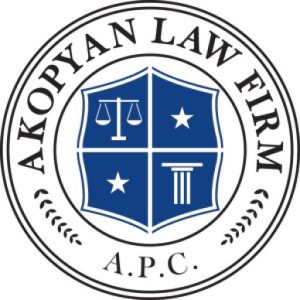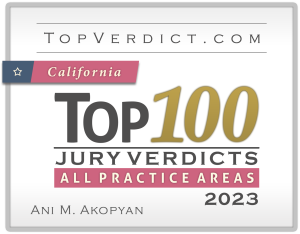Compton Employment Lawyers
The Akopyan Law Firm A.P.C. stands ready to fight for the rights of workers in Compton dealing with discrimination, harassment, retaliation, wrongful termination, or other illegal conduct in the workplace. The firm also stands ready to provide small businesses in Compton economical and efficient solutions to problems involving employment law. Our substantial experience in approaching employment disputes from both sides gives us rare insight into the mindset of the opponent, which truly goes a long way to achieving the best possible outcome.
 About Compton, California
About Compton, California
Compton is a city located in southern Los Angeles County. It covers roughly ten square miles and is home to approximately 100,000 residents. Known as the Hub City because of its location in nearly the exact geographical center of Los Angeles County, the City of Compton is one of the oldest cities in the county and the eighth to incorporate. The territory was settled in 1867 by a band of 30 pioneering families, who were led to the area by Griffith Dickenson Compton. These families had wagon-trained south from Stockton, California in search of ways to earn a living other than in the rapidly depleting gold fields. Compton’s early settlers faced severe hardship as they tilled the earth to scratch out a meager existence. The weather was cold and wet, and fuel was scarce. Gathering firewood required a three day-trip to the mountains near Pasadena. Also, in the early years there were only two general stores in the area: one in the pueblo of Los Angeles, the other in Wilmington. Both were miles away and required a lengthy trek either by foot or horseback. The City of Compton was officially incorporated on May 11, 1888. In the 1930’s the city began to shed the effects of the Great Depression of 1929, and the population increased. In the 1950’s the first African American families moved to the area. Centennial High School was built to accommodate a growing student population. In the 1960’s voters elected Douglas Dollarhide, the City’s first African American mayor. In later years the city transformed over 1500 acres of unused and underutilized land into Walnut Industrial Park. This industrial and commercial complex is home to some of the largest national and international corporations, including 3-M, Datsun, Ralphs and Xerox. Compton greeted the 21st century as a multiracial, multicultural community of nearly 100,000 residents. Compton’s easy accessibility to and from five freeways and the affordability of its housing has drawn additional residents and sparked the interest of developers.
With offices in Los Angeles, Bakersfield, Oxnard, Temecula, Rancho Cucamonga, Costa Mesa, Culver City, and San Diego the Akopyan Law Firm A.P.C. is just minutes away from Compton. Our employment lawyers stand ready to provide world-class services and top-notch representation to the residents of Compton.
Your Search For The Best Compton Employment Attorneys Is Over
Finding the right labor lawyer in Compton is indeed a significant decision, and it’s essential to select an attorney who aligns with your goals and values. Here’s how you can proceed with your search for the best employment lawyer in Compton:
1. **Online Research:** Begin your search with an online query for “employment lawyer Compton” or “wrongful termination attorney in Compton.” While you may encounter paid advertisements, these can still lead you to local attorneys who may be a good fit.
2. **Local Bar Associations:** Check with local bar associations or legal directories for listings of employment lawyers in Compton. These resources often provide information about an attorney’s specialization and credentials.
3. **Professional Organizations:** Look for labor lawyers who are members of professional organizations. Membership can indicate a commitment to employment law.
4. **Consultations:** Schedule consultations with potential attorneys. During these meetings, discuss your case and assess their approach to handling employment disputes. Inquire about their experience and track record in similar cases.
5. **Client References:** Don’t hesitate to request references from past clients. Speaking with previous clients can offer insights into an attorney’s performance, communication, and ability to achieve favorable outcomes.
6. **Legal Fees:** Discuss the attorney’s fee structure during your consultation to ensure it aligns with your budget and expectations.
7. **Case Evaluation:** Ask the attorney for an honest evaluation of your case, including its strengths and weaknesses. A reliable lawyer should provide a realistic assessment of your situation.
8. **Trust Your Instincts:** Ultimately, choose an attorney you feel comfortable with and who demonstrates a deep understanding of labor and employment law. Trust your instincts in determining the attorney’s credibility and commitment.
The Akopyan Law Firm’s commitment to achieving the best possible outcome for each client, regardless of the complexity of the case, is commendable. Their dedication to quality work and personalized service is an important factor to consider in your search for the right employment lawyer.
By conducting thorough research and consulting with prospective attorneys, you can find the right labor lawyer in Compton who will passionately advocate for your rights and work diligently to achieve the best results for your case.
We Can Help Folks From Compton With:
Featured Article:
Retaliation Concerns After Requesting Family Medical Leave and the Risk of Wrongful Termination in California
📌 Key Takeaways Retaliation worries after family medical leave often begin with subtle workplace shifts and can grow into serious fear of wrongful termination. Watch Early Behavior Shifts: Remarks about “reliability,” jokes about being “sick again,” and new public criticism after a leave request can signal changing attitudes toward commitment. Track New Discipline Patterns: A sudden wave of write-ups, counseling sessions, and attendance warnings tied to medical needs can quietly set the stage for later employment decisions. Notice Punitive Schedule Changes: Losing long-standing schedules, overtime, or safer duties and being reassigned to nights, split shifts, or heavier work can feel like punishment after leave. See Termination As a Pattern: Suddenly negative evaluations, magnified minor rule violations, and worsening conditions that push someone to resign often cluster together in potential wrongful termination stories. Treat Legal Review As Time-Sensitive: Because retaliation questions are complex and strict deadlines may apply, workers often protect their interests by promptly consulting a California employment attorney. Retaliation concerns after family medical leave are usually about accumulating patterns, not single moments. Workers in physically demanding Southern California jobs will better recognize these warning patterns, preparing them for the detailed overview that follows. Requesting family medical leave can feel like a dangerous step when every shift matters to the household budget. When discipline, schedule changes, or termination follow soon after a leave request, many workers worry about a necessary medical absence being held against them. These concerns frequently arise for workers in physically demanding jobs in Southern California. Federal and California family and medical leave laws, together with anti-discrimination protections, may treat some leave-related requests and communications as protected activity. The scope of any protection depends on specific facts, and statutes and regulations are subject to change. Official government websites can provide current up to date information, but they do not replace individualized legal advice from a California employment lawyer. When Family Medical Leave Feels Risky for California Workers in Physically Demanding Jobs Workers in construction, warehouse operations, production lines, manufacturing, retail, food service, landscaping, and delivery often support entire households on modest wages. A serious injury, surgery, or a family member’s medical crisis can make time away from work unavoidable, yet requesting family medical leave may feel dangerous when rent, groceries, and childcare depend on steady hours. Feelings of guilt about missed shifts and anxiety about being labeled unreliable can grow quickly, especially when treatment at work seems to change after a leave request. Everyday Workplace Changes That Can Raise Retaliation Concerns Retaliation can appear in ways other than immediate firing. Often, the first signs show up in day-to-day treatment after a worker asks for time off related to a serious health condition or caregiving responsibility. Sudden Negative Treatment After a Leave Request A previously steady relationship with a supervisor may begin to feel strained. Remarks about “reliability,” jokes about being “sick again,” sighs when medical appointments are mentioned, or new public criticism can create a sense that commitment is being questioned. When this change appears soon... Read more









Millions of Dollars Recovered For Our Clients
Check Out Our Case Results



